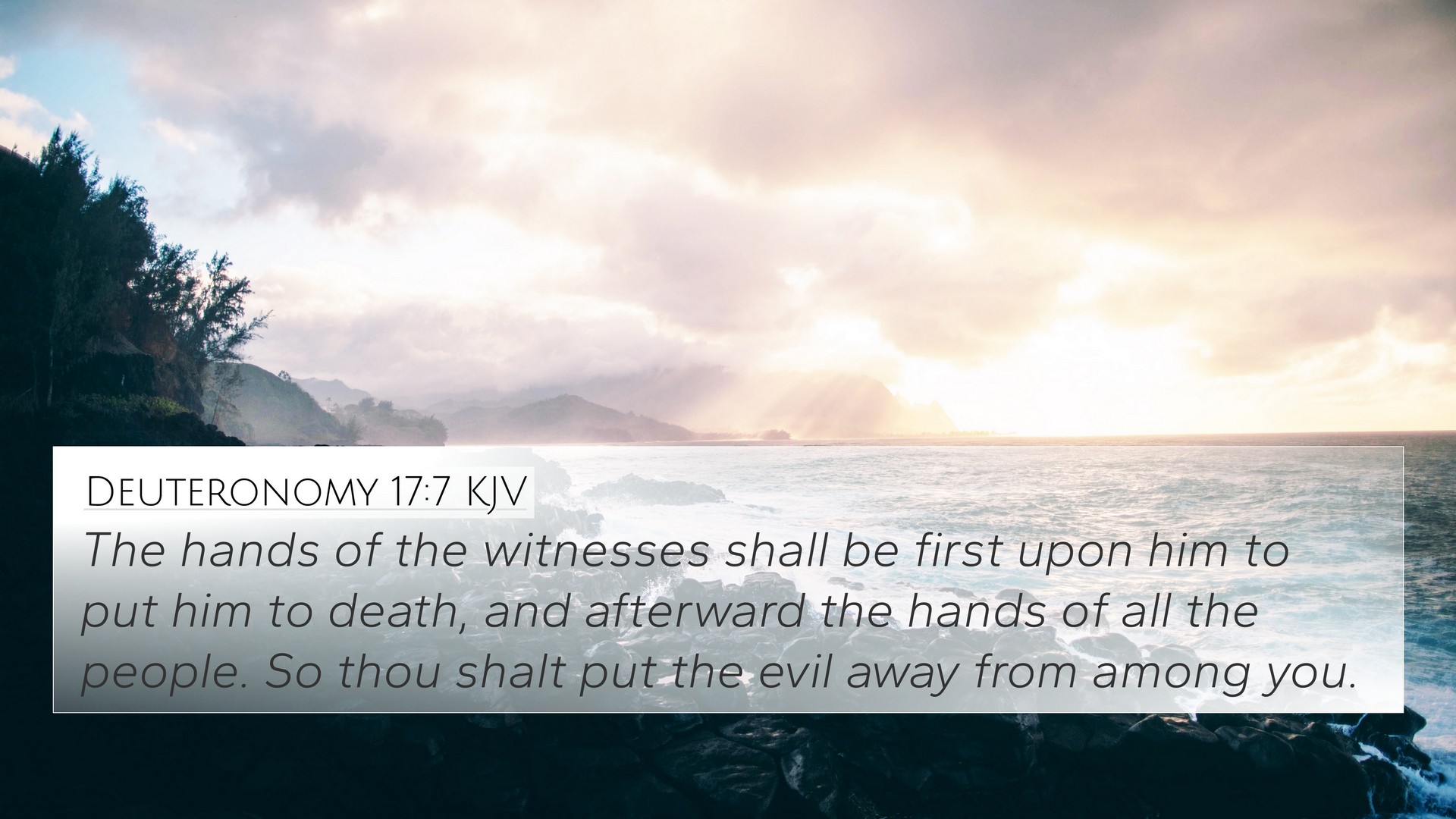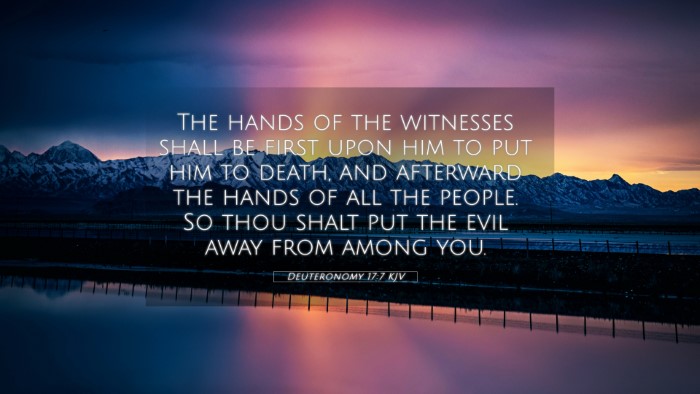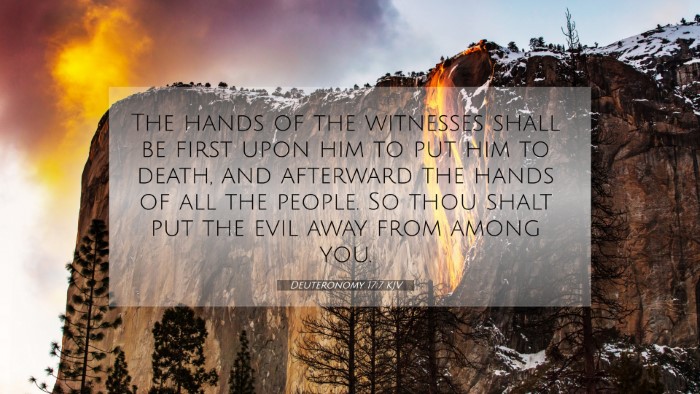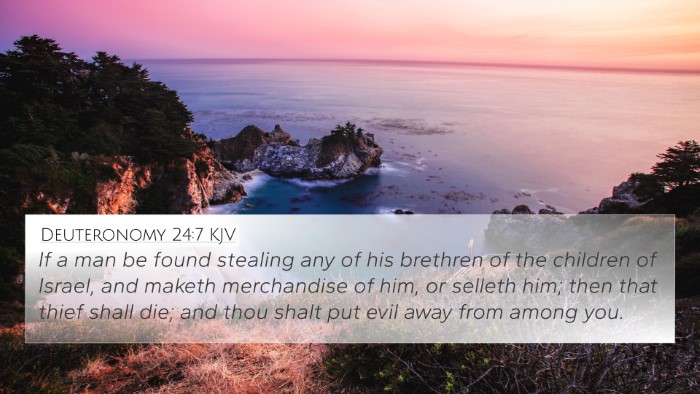Understanding Deuteronomy 17:7
Bible Verse: Deuteronomy 17:7
This verse states: "The hands of the witnesses shall be first upon him to put him to death, and afterward the hands of all the people." This command underscores the seriousness of bearing false witness and the community's role in administering justice.
Summary of Meaning
Deuteronomy 17:7 addresses the legal procedure for dealing with capital offenses in ancient Israel, illustrating the principle of communal responsibility in justice. The verse indicates that witnesses play a pivotal role in a person's condemnation, specifically highlighting that those who bring a charge or testimony must take the initial step in the execution of justice.
Insights from Public Domain Commentaries
- Matthew Henry:
Henry emphasizes the importance of sincerity in witness bearing. He notes the significant moral obligation placed on witnesses to ensure justice is served rightly and that their testimony must be true. The act of the witnesses being the first to act symbolizes their responsibility, implying that they must be certain of what they have witnessed before testifying.
- Albert Barnes:
Barnes provides insight into the structure of judicial proceedings in Israel. He stresses that this command was intended to deter false testimonies and violence within the community. By holding the witnesses accountable, the scripture seeks to promote truth and righteousness, reflecting God's desire for justice to be tempered with responsibility and care.
- Adam Clarke:
Clarke discusses the broader implications of communal involvement in justice. He notes that the collective participation serves to cleanse the community from guilt and wrongdoings, thus restoring societal order. Additionally, Clarke highlights that this principle can be seen as setting a precedent for moral accountability among individuals, urging a collective pursuit of righteousness.
Cross References
Deuteronomy 17:7 connects to several principles and narratives throughout the Bible that reflect justice and the weight of testimony:
- Exodus 20:16: "You shall not bear false witness against your neighbor." This foundation of the moral law highlights the importance of truthful testimony.
- Numbers 35:30: "If anyone kills a person, the murderer shall be put to death on the evidence of witnesses..." This verse reinforces the judicial system's dependence on the integrity of witness accounts.
- John 8:7: "...Let him who is without sin among you be the first to throw a stone at her." This reflects on the moral responsibility that witnesses carry before enacting judgment.
- Matthew 18:16: "But if he does not listen, take one or two others along with you, that every charge may be established by the evidence of two or three witnesses." This emphasizes the necessity of corroborating testimonies in matters of judgment.
- 1 Timothy 5:19: "Do not admit a charge against an elder except on the evidence of two or three witnesses." This mirrors the communal approach to establishing truthfulness within the community.
- Acts 7:58: The stoning of Stephen is an example of communal judgment and the weight of bearing witness — reflecting both the virtue and potential peril of testimonies.
- Romans 2:15: "They show that the work of the law is written on their hearts, while their conscience also bears witness..." This demonstrates the internal moral compass that aligns with the external laws and witnesses.
Linking Bible Scriptures
The connections between Bible verses related to justice and testimony are critical for understanding the ethical framework within which these ancient laws were implemented. Cross-referencing biblical texts enables one to delve deeper into themes such as responsibility, morality, and community cohesion.
Thematic Bible Verse Connections
Explorations into the thematic links between verses such as Deuteronomy 17:7 and the New Testament reveal an ongoing dialogue about law, grace, and individual accountability:
- Hebrews 10:28-29: Contrasts the severity of judgment under the law with the grace provided through Christ, questioning the greater condemnation for those who reject grace.
- James 1:22: "But be doers of the word, and not hearers only, deceiving yourselves." This calls into account the action that should follow testimony, urging believers to align words with deeds.
- Galatians 6:1: "Brothers, if anyone is caught in any transgression, you who are spiritual should restore him in a spirit of gentleness." This highlights the role of community in correction and redemption.
Exploring Cross-Referencing Methods
The exploration of inter-Biblical dialogue through rigorous cross-referencing can enhance one's understanding of scripture. Some effective methods include:
- Utilizing a Bible concordance to locate similar themes and topics across different books.
- Engaging in comparative Bible verse analysis by examining related verses and contrasting their context and implications.
- Employing a Bible cross-reference guide to create thematic chains that explore specific doctrines or narratives throughout both the Old and New Testaments.
- Following a comprehensive Bible cross-reference system which organizes verses by themes, doctrines, or key events for in-depth study.
Conclusion
Deuteronomy 17:7 presents profound insights into justice, communal responsibility, and the integrity required of witnesses. Its implications stretch throughout Scripture, revealing a consistent divine standard for truth and accountability. The exploration of this verse through various public domain commentaries and cross-referencing related scriptures enhances understanding of these themes, ultimately guiding believers toward a deeper appreciation for God’s law and justice.
Further Reflections
In addition, considering how this verse undergirds various principles prevalent in both the Old and New Testaments is essential. It provides a lens through which one can explore broader theological debates and practical applications in the life of a believer.










